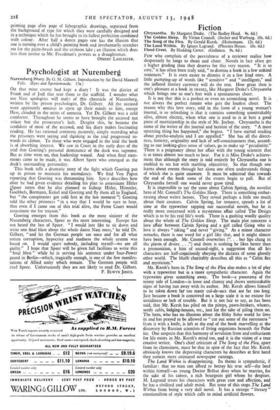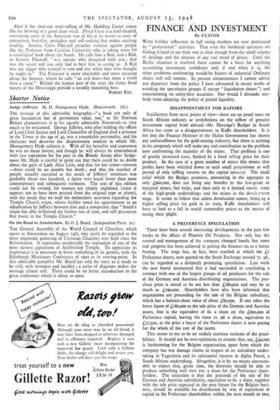Fiction
FEW who complain of the peevishness of a reviewer realise how desperately he longs to shout and cheer. Novels in fact often get a higher grading than they deserve for this very reason. "It is so easy," it has often been truly said, " to dismiss a book in a few unkind sentences." It is even easier to dismiss it in a few kind ones. A little pumping-up of words like " Sensitive " and "intelligent," and the inflated literary currency will do the rest. How great then is one's pleasure at a book in twenty, like Margaret Drake's Chrysantha which brings one to one's feet with a spontaneous cheer.
It is not that this is a perfect or even an astonishing novel. It is not always the perfect runner who gets the loudest cheer. The reason why this love story, told in the form of a young woman's journal, is so refreshing is that it contains something unmistakably alive, almost electric, when what one is used to is at best a good piece of morticianship in the style of Mr. Joyboy. Chrysantha is the name of the writer of the journal and heroine of the story. "A most upsetting thing has happened," she begins. "I have started reading about psycho-analysis and I am appalled." She has all the direct- ness, honesty, originality and lack of self-consciousness that, accord- ing to our looking-glass sense of values, go to make up "peculiarity." There is a poignancy about her affair with the young scientist that is at times almost too much to bear. For it is Miss Drake's achieve- ment that although the story is told entirely by Chrysantha one is enabled to see her with startling objectivity. So that though one learns about events through her alone one often understands things of which she is quite unaware. It must be admitted that towards the end of the_ book some of the events begin to pall. But of Chrysantha herself one would never grow tired.
It is impossible to say the same about Calvin Spring, the novelist hero of Mr. Connell's The Golden Sleep. There is something embar- rassing about writer heroes. They reveal perhaps a little too much about their creators. Calvin Spring, for instance, spends a lot of time at the typewriter tapping out successful novels, but he is really more concerned with a mysterious affair called The Design which is to be his real life's work. There is a gushing woolly quality about the whole of The Golden Sleep. The main plot concerns a love affair between Calvin Spring and a girl called Grieg who in love is always " taking " and never "giving." As a minor character remarks, there is one word fof a girl like that, and it might almost have been enough. Mr. Connell overwrites (". . . her lips clung in the plasm of desire. . . .") and there is nothing he likes better than a premonition, a hint of- second-sight, a suggestion that all his characters are half-consciously obeying the dictates of some ghostly other world. The blurb charitably describes all this as "Celtic fire and mysticism."
Mr Kersh's hero in The Song of the Flea also makes a lot of play with i:typewriter but -is a 'more sympathetic character. Again the typewriter gives something away. The book—a panorama of the seamy side of London—is loose and clumsy and shows unmistakable signs of having run away with its author. Mr. Kersh allows himself to be taken down' fait too many cul-de-sacs that are far too long. Just because a book is- conceived on a large scale it is no excuse for untidiness or lack of trouble. But it is not fair to say, as has been said, that Mr. Kersh has piled on the pimps, pawn-brokers, whores, seedy cafés, lodging-houses, etc., just for the sake of piling them on. The hero, who has no illusions about the filthy Soho world he lives in and has prayed to be allowed to "cut out some of the rottenness" from it with a knife, is left at the end of the book marvelling at the discovery by Russian scientists of living organisms beneath the Polar ice. One suspects that this harmony of revulsion from and enthusiasm for life exists in Mr. Kersh's mind too and it is the vision of a true creative writer. One's chief criticism Of The Song of the Flea, apart from its clumsiness, must be that in spite of the fact that Mr. Kersh obviously knows the depressing characters he describes at first hand they remain mere animated newspaper cuttings.
The Land Within is disappointing. Its theme is sympathetic, if familiar: that no man can afford to betray his true self—the land within himself—as young Doctor Brehat does when he marries, for the sake of his career, a rich bourgeois girl whom he despises. M. L,egrand treats his characters with great care and affection, and he has a civilised and adult mind. But none of this stops The Land Within from being a very dull novel. It has a strange " literary " emotionalism of style which calls to mind artificial flowers.
After it the clear-cut story-telling of Mr. Hodding Carter comes like the blowing of a good clean wind. sFlood Crest is a level-headed, convincing story of the American way of life at its worst—a story of corruption, brutality, prejudice and self-seeking that makes exciting reading. Senator Cleve Pikestaff preaches violence against people like the Professor from Carolina University who is taking notes for a sociological book about the South. He calls him a Red, and a Red, to Senator Pikestaff, "was anyone who disagreed with you ; that was the secret and you only had to beat him to saying so. A Red was any nigger who wanted to vote and any white man who thought he ought to." The Professor is more charitable and more accurate about the Senator, whom he calls "an evil man—but more a result than a cause." Behind the human part of the story the rising flood waters of the Mississippi provide a steadily mounting bass.
ROBERT KEE.



































 Previous page
Previous page